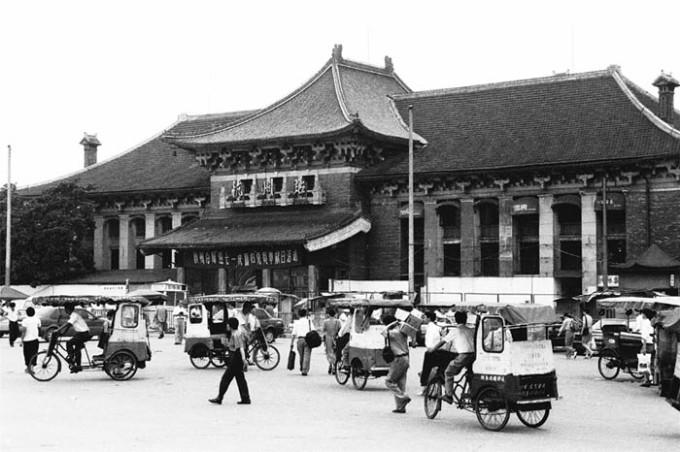Urban history: a knowledge base for urban development

An old train station in Hanghou city that stopped operation in June 1997
Photographed by Hong Fen
Starting from 2013, the Hangzhou Cultural and Historical Research Association will embark on a five year project investigating various aspects of the city’s history, including industrial development, urban construction, transportation development, etc. It is expected to provide knowledge and referential experience for current urban development.
Since the 1980s, China’s rapid urbanization has drawn more and more scholars toward the study of urban history; research on Shanghai, Tianjin, Chongqing and Wuhan has achieved significant results.
Chinese Urban History Studies grow fast
According to incomplete statistics, during the period from 1979 to 2010, publications on Chinese urban history totaled more than 2,000 volumes.
Professor Li Changli at the Institute of Modern History at the Chinese Academy of Social Sciences, said that in the past 20 or more years, the urban development in China has inspired many new topics and subfields among urban historian. Research in the area is blossoming. Particularly in recent years, publications of Chinese urban history have seen greater serialization, covered a broader range of issues and reached a more international audience.
Urban history is a branch of history. It originated in the 1920s in the west and saw a revival in the 1960s; till 1980s, the subject had only gradually drawn attention from Chinese academia. He Yimin, vice president of the Chinese Urban History Association and director of the Institute of Urban Studies at Sichuan University, noted that China’s social development, urbanization, industrialization and modernization are the driving forces of Urban History Studies. Scholars often take major emerging cities such as Shanghai, Tianjin, Chongqing and Wuhan as original research subjects; today, their research is developing quickly.
Studies are not equally developed in different regions
“Current urban history study can be summarized by ‘non-balance,’” said Liu Shilin, Liu noted that urban history as an academic discipline has developed to different levels in different geographic regions. It is a multidisciplinary subject that encompasses history, politics, sociology, archaeology, anthropology and folklorics. However, study in China has primarily centered on literature collection, economic history, social history and other area-specific history. These studies are “deep but narrow,” and therefore not broad enough to review the entirety of Chinese urban development.
Lin Shilin also noted there are two overriding questions concerning the nature of the discipline. First, scholars should bear in mind the question, “What is the relation between ’history’ and ’argument?’”. This question has long been an issue of debate in Chinese historiography. The central element in this debate is whether historical study should only confined to the study “facts,” or whether it should also reflect “thoughts.” Secondly, Lin emphasized that scholars should reflect on the relation between “truth” and “values,” which is of timely significance for urban history studies. In taking history as a mirror, properly handling the contradictions between returning to the “truth” and constructing “values” is a distinct issue that requires profound thought and discussion.
Regarding the existent questions in urban history, Li Changli thinks there is yet to be any relatively mature and widely accepted theory examining the development of Chinese urban development from a macro perspective.
He Yimin agreed China has not developed an authoritative theoretic paradigm in the area of urban history. In addition, he emphasized that methodology should be diversified, not limited to applying traditional and unitary methods.
Theoretical research is a source for urban construction
The urbanization rate in China currently exceeds 50%, a huge historical development. Scholars agree that the study of urban history will play a more and more important role for urban construction.
Liu Shilin said urban history can integrate cultural resources, which are very valuable for current urban cultural construction. More importantly, studies of urban history can facilitate the establishment of theories, rules and models for Chinese urban planning and development.
He Yimin pointed out that the Report of the 18th National Congress of the CPC highlighted “urbanization” many times, which is a tremendous driving force for the discipline of urban history. He proposed strengthening research from several aspects. First, he suggested increasing discussion and investigation in order to establish both theories and methods more in line with China’s situation. Along with those, He emphasized that studies should expand both directions in scale—more macro studies should be conducted in addition to more case studies—and that the specific and the vast should be combined into comprehensive studies. He also suggested that urban historians expand their coverage and conduct more comparative studies. Ultimately, he hopes the discipline will be combined with the practice.
Translated by Feng Daimei
The Chinese version appeared in Chinese Social Sciences Today, No. 417, February 20, 2013.
Chinese link: http://www.csstoday.net/Item/49513.aspx
